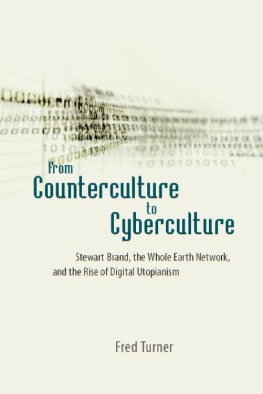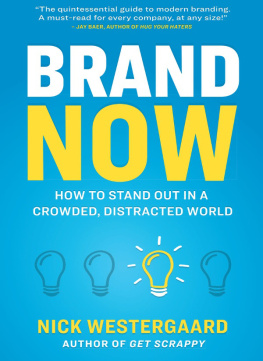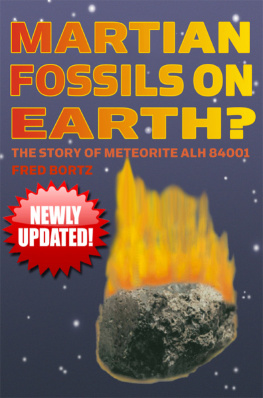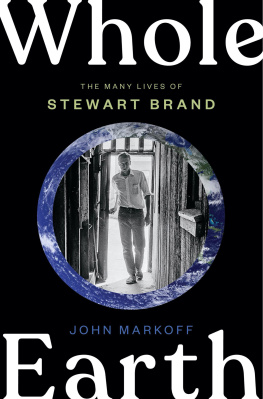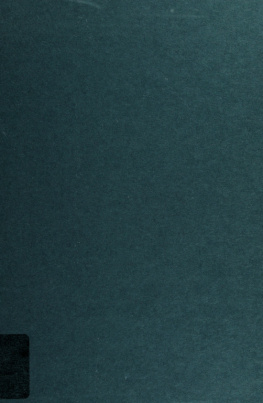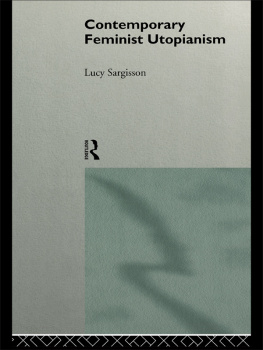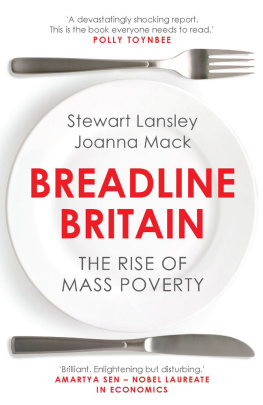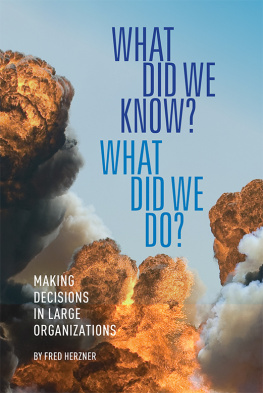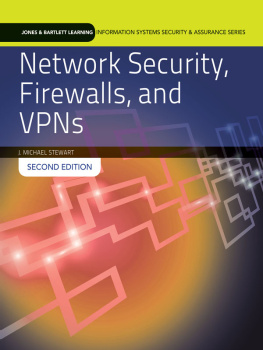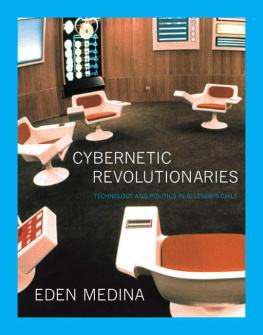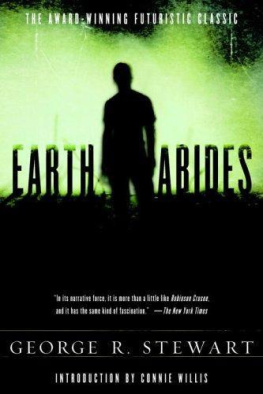Fred Turner - From Counterculture to Cyberculture: Stewart Brand, the Whole Earth Network, and the Rise of Digital Utopianism
Here you can read online Fred Turner - From Counterculture to Cyberculture: Stewart Brand, the Whole Earth Network, and the Rise of Digital Utopianism full text of the book (entire story) in english for free. Download pdf and epub, get meaning, cover and reviews about this ebook. City: Chicago, year: 2006, publisher: University of Chicago Press, genre: Politics. Description of the work, (preface) as well as reviews are available. Best literature library LitArk.com created for fans of good reading and offers a wide selection of genres:
Romance novel
Science fiction
Adventure
Detective
Science
History
Home and family
Prose
Art
Politics
Computer
Non-fiction
Religion
Business
Children
Humor
Choose a favorite category and find really read worthwhile books. Enjoy immersion in the world of imagination, feel the emotions of the characters or learn something new for yourself, make an fascinating discovery.
- Book:From Counterculture to Cyberculture: Stewart Brand, the Whole Earth Network, and the Rise of Digital Utopianism
- Author:
- Publisher:University of Chicago Press
- Genre:
- Year:2006
- City:Chicago
- Rating:5 / 5
- Favourites:Add to favourites
- Your mark:
- 100
- 1
- 2
- 3
- 4
- 5
From Counterculture to Cyberculture: Stewart Brand, the Whole Earth Network, and the Rise of Digital Utopianism: summary, description and annotation
We offer to read an annotation, description, summary or preface (depends on what the author of the book "From Counterculture to Cyberculture: Stewart Brand, the Whole Earth Network, and the Rise of Digital Utopianism" wrote himself). If you haven't found the necessary information about the book — write in the comments, we will try to find it.
Fred Turner: author's other books
Who wrote From Counterculture to Cyberculture: Stewart Brand, the Whole Earth Network, and the Rise of Digital Utopianism? Find out the surname, the name of the author of the book and a list of all author's works by series.
From Counterculture to Cyberculture: Stewart Brand, the Whole Earth Network, and the Rise of Digital Utopianism — read online for free the complete book (whole text) full work
Below is the text of the book, divided by pages. System saving the place of the last page read, allows you to conveniently read the book "From Counterculture to Cyberculture: Stewart Brand, the Whole Earth Network, and the Rise of Digital Utopianism" online for free, without having to search again every time where you left off. Put a bookmark, and you can go to the page where you finished reading at any time.
Font size:
Interval:
Bookmark:
If Ive learned anything in the last seven years, its that ideas live less in the minds of individuals than in the interactions of communities. The ideas in this book are no exception: they owe their origin to a far-flung network of extraordinarily generous teachers, colleagues, friends, and interviewees, to all of whom Im very grateful.
I first began thinking about the Whole Earth network and the politics of information technology while I was a PhD student in the Department of Communication at the University of California, San Diego. My professors there offered me an ideal mix of direction and freedom. They consistently demanded that I reach across disciplinary boundaries, pursue difficult questions, and find my own voice on the page. As my early interests gelled into a dissertation, Professors Michael Schudson, Robert Horwitz, Chandra Mukerji, Geoffrey Bowker, Lev Manovich, Philip Agre, and Steven Epstein each introduced me to new literatures, read multiple drafts of chapters, and patiently helped me frame my fascination with the Whole Earth Catalog in analytical terms.
Together, they offered me a model of what a life devoted to engaged, public-minded scholarship and committed teaching could be. I would also like to thank my fellow graduate students Lonny Brooks, Cyn-thia Chris, Carol Christopher, Tarleton Gillespie, Mary Gray, Steve Jackson, Sujeong Kim, Barbara Osborn, Mauro Porto, Matt Ratto, and Jennifer Rayman for their encouragement and friendship.
Three years into my work at UCSD, I moved to Boston and began teaching at the Massachusetts Institute of Technologys Sloan School of Management. MIT is the kind of place where you can be hired to play in one intellectual sandbox and suddenly find yourself jumping into others; fortunately, thats what happened to me. There I had the incredible luck to find three new teachers: Professors JoAnne Yates, Pablo Boczkowski, and Joe Dumit. They introduced me to much of the literature in the fields of organizational sociology and science and technology studies that informs this book. Sloan also allowed me to teach with a highly experienced and delightful group of colleagues, including Lori Breslow, Neal Hartman, Leigh Hafrey, and Melissa Raffoni, all of whom made coming to work a treat. At the same time, I found my way to MITs Comparative Media Studies Program, where Professors Henry Jenkins, William Uricchio, and David Thorburn taught me a great deal about the dynamics of digital media and contemporary culture. So did three graduate students with whom I worked: David Spitz, Anita Chan, and Zhan Li. I also want to thank Catherine Friedman, then head of MITs Dewey Library, and her staff for going to exceptional lengths to keep my office bookshelves well stocked.
Since 2003 I have been happily housed in the Department of Communication at Stanford University. Writing this book at Stanford has been a delight for a number of reasons. For one, many of the events I have written about took place within shouting distance of my office. Thus I have been allowed to enjoy one of the peculiar pleasures of those who study the past: the chance to walk through a landscape and in the same moment to see it as it is and imagine it as it used to be. But more than that, I am grateful to my colleagues in the department. Jeremy Bailenson, Jim Bettinger, Henry Breitrose, Jim Fishkin, Dawn Garcia, Ted Glasser, Shanto Iyengar, Jan Krawitz, Jon Krosnick, Marion Lewenstein, Marcyliena Morgan, Cliff Nass, Byron Reeves, Don Roberts, Kris Samuelson, and Bill Woo have all shared the kind of insights and offered the kind of support that make writing a book possible.
The departments administrative and technical staff have been unfailingly helpful as well. I would like to thank Susie Ementon, Joan Ferguson, Michael Forte, Joyce Ichinose, Barbara Kataoka, Kathleen Magner, Mark Urbanek, and Mark DeZutti for all their hard work on this projects behalf. And I would like to thank two undergraduate research assistants, Adam Maenhout and Joel Lewenstein, for their unstinting hustle.
Outside the department, I have enjoyed the support of faculty and staff from around the university. Steve Barley, co-director of the Center for Work, Technology, and Organization, and Woody Powell, professor of education and director of the Scandinavian Consortium for Organizational Research, have both pushed me to rethink the relationship between media technologies and organizations. Both have also given me rich opportunities to test my ideas within their respective research groups. Professors Scott Bukatman of the Art Department, Michael Shanks of Classics, and Tim Lenoir of History (now at Duke), together with the graduate students and visitors of the Critical Studies in New Media Seminar, have kept me focused on thinking about the ways that emerging media may shape the future.
Without the staff of the Stanford University libraries, this book could not have been written. Under the leadership of University Librarian Michael Keller, the library has collected not only the archives of the Whole EarthCatalog and the personal papers of Stewart Brand, but also a whole host of records covering the past fifty years of technological and cultural change in the region. Henry Lowood, curator of science and technology at the library, has generously guided me through these materials, as have Alex Pang, Steven Mandeville-Gamble, and Sean Quimby. Chris Bourg and Glen Worthey have continued to point me to new digital resources, while Roberto Trujillo, Polly Armstrong, Margaret Kimball, Christy Smith, Peter Whidden, and the whole staff of the Special Collections Department have bent over backward to help me work with previously unexamined archival materials.
Over the past two years, as the book began to take shape, I have had the opportunity to think it through out loud with several engaged and congenial groups. I would particularly like to thank Jennifer Light and the faculty and students of Northwestern Universitys Department of Communication Studies, and AnnaLee Saxenian, Nancy Van House, and the University of California, Berkeley, School of Information Management and Systems for allowing me to present my work in progress and for making it better with their comments. For the same reasons, I am also grateful to David Silver, Adrienne Massanari, and the Ford Foundation for organizing the miniconference Critical Cyberculture Studies at the University of Washington, and to Geoffrey Bowker, the Social Science Research Council, and Santa Clara Universitys Center for Science, Technology, and Society for convening the two-day session Digital Cultural Institutions and the Future of Access. I also thank fellow panelists and audiences at the annual meetings of the Association of Internet Researchers, the International Communication Association, the Society for the History of Technology, and the Society for Social Studies of Science, all of whom offered valuable feedback on my work.
Once the manuscript had solidified, a small group of colleagues and friends bore down on it, challenged my arguments, and made it a much stronger book than it otherwise would have been. Im especially grateful to Hsiao-Yun Chu, Sharon Ghamari-Tabrizi, Roy Rosenzweig, Jonathan Sterne, and the anonymous readers for the University of Chicago Press for their rigor and care, and to my agent, Geri Thoma, and my editor, Doug Mitchell, for their steady encouragement and warmth.
Perhaps the people to whom this book owes the most are those whose lives and work it explores. They have been extraordinarily open and forthcoming, devoting hours and sometimes days to helping me understand their histories. For all of their help, Id like to thank Bob Albrecht, Dennis Allison, John Perry Barlow, Reva Basch, Keith Britton, Lois Britton, John Brockman, Michael Callahan, John Coate, Doug Engelbart, Bill English, Lee Felsenstein, Cliff Figallo, David Frohman, Asha Greer (formerly Barbara Durkee), Katie Hafner, Paul Hawken, Alan Kay, Kevin Kelly, Art Kleiner, Butler Lampson, Liza Loop, John Markoff, Jane Metcalfe, David Millen, Nancy Murphy, Richard Raymond, Danica Remy, Howard Rheingold, Louis Rossetto, Peter Schwartz, Mark Stahlman, Gerd Stern, Shirley Streshinsky, Larry Tesler, Paul Tough, Jim Warren, and Gail Williams. Most of all, I thank Stewart Brand, whose openness to this project has been a lesson in itself.
Font size:
Interval:
Bookmark:
Similar books «From Counterculture to Cyberculture: Stewart Brand, the Whole Earth Network, and the Rise of Digital Utopianism»
Look at similar books to From Counterculture to Cyberculture: Stewart Brand, the Whole Earth Network, and the Rise of Digital Utopianism. We have selected literature similar in name and meaning in the hope of providing readers with more options to find new, interesting, not yet read works.
Discussion, reviews of the book From Counterculture to Cyberculture: Stewart Brand, the Whole Earth Network, and the Rise of Digital Utopianism and just readers' own opinions. Leave your comments, write what you think about the work, its meaning or the main characters. Specify what exactly you liked and what you didn't like, and why you think so.

